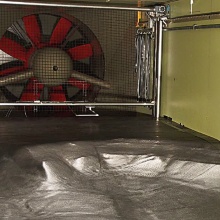How can the field of "Environmental Aerodynamics" at IAG be imagined?
A diagram of the classification within aerodynamics should illustrate this.
While "Industrial Aerodynamics" generally covers the area of flow and flow problems outside "Aircraft Aerodynamics", "Environmental Aerodynamics" deals in particular with the sub-areas of "Industrial Aerodynamics" in which the natural wind causes the flow around a body.
In the past, the IAG mainly carried out investigations into the field of "Building Aerodynamics", but for some years now the current research focus has been on "Landscape Aerodynamics".
Currently, the velocity field over a complex topography is measured experimentally in the boundary layer wind tunnel of the IAG.
This is a landscape model of the Albaufstieg near Schnittlingen (Donzdorf, district Göppingen) on a scale of 1:400.
Fields of activity at Environmental Aerodynamics at the IAG:
- Experimental research
- Wind comfort investigations
- Execution of wind tunnel investigations to determine the expected wind loads (e.g. on buildings, solar modules etc.)
- Anemometer calibration
- Contract investigations in the field of industrial aerodynamics, partly on individually manufactured test rigs
Measurement Techniques
3-axis traverse system for different probes
various Pitot, Prandtl and keel probes - various capacitive, inductive and piezoresistive differential pressure transducers
multiple strain gauge force transducers for different load ranges
Multi-component scales for different load ranges
Pressure scanner "DSA 3217" for simultaneous differential pressure measurement of 16 channels (max. sampling rate: 250 Hz)
various hot wires and X-wires incl. probe holder- multi-channel hot wire bridge rack from "A.A. Lab-Systems"
2 distance sensors (laser triangulation)
Visualization with the help of smoke in connection with the laser light section method: Smoke probe
3B visualization laser incl. cylindrical lens
Wall painting (petroleum / soot)
Particle Image Velocimetry (PIV); only temporarily
2-axis traversing frame for automated PIV measurements;
1-axis miniature traverse system for correlation measurements with two hot wires
Research in Environmental Aerodynamics
The following wind tunnels are available for measurements in the field of environmental aerodynamics:
The Boundary-Layer Wind Tunnel (GWK)
The GWK can be used to investigate the flow around buildings (e.g. to determine the wind loads), and it is also possible to measure velocity fields over complex topography (e.g. flow around hills or steep slopes).
Medium Size Low-Speed Wind Tunnel (MWK)
The Medium-Sized Low-Speed Wind Tunnel (MWK) is a circulating wind tunnel (Göttinger type) with free jet measuring section and circular jet cross section.
The Small Boundary-Layer Wind Tunnel (KGWK)
Due to the smaller dimensions of the channel, the bottom boundary layer of the KGWK can be measured within a short time with the aid of a specially manufactured, so-called Pitot rake (see picture).
Contact
Bernd Peters
Dr.-Ing.Academic Staff Member working group Environmental Aerodynamics








